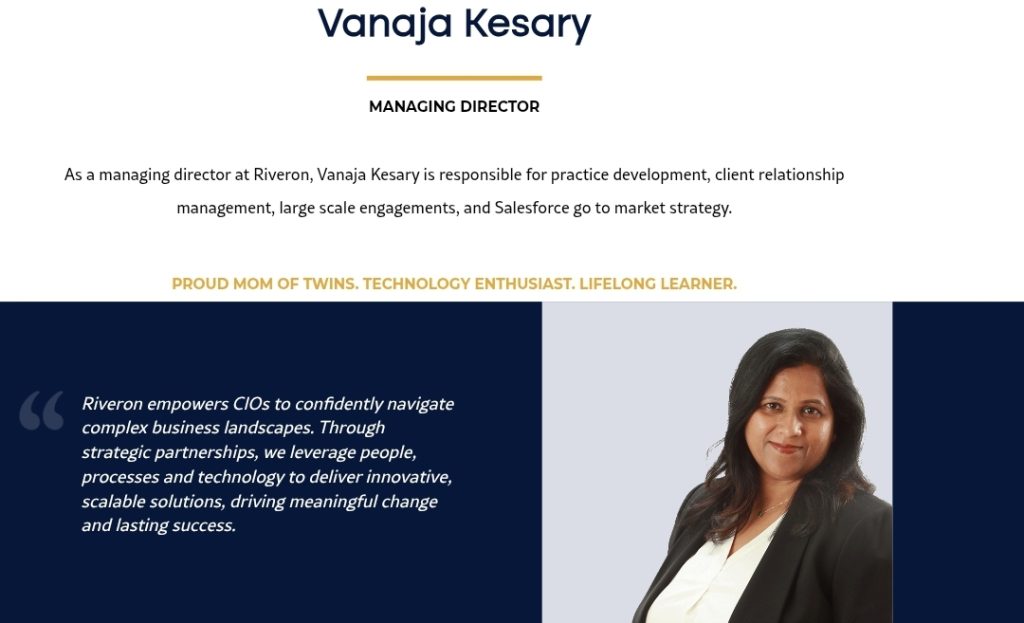Today’s customers expect more than just prompt service—they want businesses to know them, value them, and adapt to their changing needs. In fact, at the heart of delivering such experiences lies a seamless blend of technology and empathy. To explore how organizations can achieve this balance, we had the pleasure of speaking with Vanaja Kesary, Managing Director at Riveron, a global advisory firm helping clients enhance business outcomes through AI, ERP/CRM systems, automation, and analytics.
Vanaja Kesary is a digital transformation expert with a deep understanding of enterprise solutions, customer-centric strategies, and the intersection of emotional intelligence with technology. At Riveron, as a matter of fact, she leads initiatives focused on reimagining the role of customer experience in modern businesses, with a keen eye on the value of hybrid CRM models.
Riveron is a global business advisory partner supporting CFOs, CIOs, and C-suite leaders in rethinking their approach to transformation. From ERP/CRM implementation and managed services to intelligent automation and analytics, Riveron empowers enterprises to innovate while staying agile in a rapidly evolving landscape.
Vanaja, thank you for joining us today. We’re excited to explore your views on hybrid CRM, the growing role of emotional intelligence in customer experience, and, in fact, how Riveron is paving the way for more meaningful, predictive, and lasting client relationships.
Hybrid CRM?
Q1. What does Hybrid CRM mean to you, and why is it such a critical innovation today?
VK: Hybrid CRM blends the scalability of cloud-based systems with the control of on-premises infrastructure, offering organizations the best of both worlds. This approach is critical today as it allows businesses to tailor their CRM strategy based on operational, regulatory, and data security needs—especially important in industries like finance.
For me, Hybrid CRM is about agility. It enables seamless integration across platforms, laying the foundation for innovation. For example, I supported a leading cloud security provider in embedding Salesforce CRM into its back-office systems to enable in-product free trials and real-time support—enhancing both marketing and customer experience within a product-led GTM strategy.
Similarly, Riveron experts partnered with a leading payroll solutions provider to design and implement a range of in-product customer journeys. The team seamlessly integrated these experiences with Salesforce CRM and the client’s contact center, delivering a cohesive and unified customer experience across channels.
Additionally, companies are Incorporating AI-driven features like automation and agentic bots with CRM systems to enhance customer service and drive deeper engagement. In today’s fast-evolving digital landscape, Hybrid CRM is essential for bridging legacy systems and modern cloud technologies while enabling scalable, secure, and connected customer engagement.
Automation – Enhances or Replaces?
Q2. People often frame automation as cold or impersonal. How does Riveron ensure that automation enhances—not replaces—the customer experience?
VK: At Riveron, automation is designed from the perspective of an efficient customer journey—not just operational efficiency. We focus on building a unified platform that integrates seamlessly across every stage of the journey, avoiding fragmented or temporary solutions. Automation is an ongoing process typically implemented in phases, and our team of CRM experts always keep a clear end goal in mind: enhancing the overall customer experience.
We’re intentional about where automation is used and where human interaction is essential. The goal isn’t to replace people, but to empower them—enabling teams to work efficiently and focus on high-value interactions that matter to our clients. In a recent engagement, with a SAAS product customer, we implemented AI enabled automation for many use cases to automatically respond to customer support cases, based on historic patterns. However, the automation was enabled only for cases that occurred frequently with a clear historic pattern. This freed up the support team to spend more time resolving new complex cases – improving efficiency and reducing ticket resolution times.
By striking the right balance between automation and human touch, we ensure that technology enhances engagement, not distance—delivering a smarter, more connected experience that feels responsive, not robotic.
Tech-driven CRM Strategy
Q3. In your view, where does human insight shine the most in a tech-driven CRM strategy?
VK: In a tech-driven CRM strategy, human insight plays a crucial role across several key areas that elevate the customer experience beyond automation. While CRM tools and machine learning algorithms excel at capturing vast amounts of real-time data on customer interactions, behaviors, and preferences, it’s the human touch that ensures this data is accurate, and actionable.
Data hygiene and accuracy are foundational to any CRM strategy. Automation can collect and organize information efficiently, but human oversight is essential to validate inputs, spot inconsistencies, and maintain a clean, reliable data pool that supports effective decision-making.
Beyond data, human insight brings in the elements that machines can’t replicate—active listening, emotional intelligence, and genuine customer understanding. These are critical in interpreting data within the right context and crafting personalized, memorable experiences that resonate on a deeper level.
Emotional Intelligence Incorporation
Q4. Can you elaborate on how Riveron, in fact, incorporates emotional intelligence into digital customer journeys?
VK: In my experience, embedding emotional intelligence into the digital customer journey can significantly enhance satisfaction, even transforming negative experiences into positive outcomes. At Riveron, we view emotional intelligence not just as a soft skill but as a strategic enabler to equip our clients for a deeper, more meaningful customer connection.
A well-integrated customer experience journey equips support teams with real-time access to relevant data and contextual customer details. This visibility allows team members to better understand each customer’s history, preferences, and pain points—enabling more empathetic, personalized, and timely responses.
By connecting data and workflows across platforms that manage both sales and service interactions, we provide our clients with a holistic view of their customers. This unified insight empowers them to be not only efficient but also emotionally attuned—able to respond with compassion, recognize moments that require a human touch, and build trust through consistent, high-quality engagement.
Tangible Outcomes
Q5. What are some tangible outcomes you’ve observed when AI and human empathy work in sync within CRM environments?
VK: When systems are designed to augment a human with AI, the impact is exponential – often increasing human effectiveness by up to 10 times. AI can analyze the customer behavior patterns, and the human agent can now apply emotional intelligence and empathy to tailor personalized messaging. Customers feel seen and understood increasing overall customer experience and satisfaction.
Similarly, in sales and prospecting scenarios, AI assists with the next best actions based on real-time insights. Human representatives can then deliver with empathy and persuasion, often resulting in higher conversion rates and effective sales conversations.
Common Pitfall to Avoid
Q6. For companies just starting their hybrid CRM journey, what’s one common pitfall to avoid?
VK: One of the most common pitfalls for companies beginning their hybrid CRM journey is overlooking data quality. Automation relies heavily on accurate data for strategic decision making and the right actions at the right time. If companies’ records are duplicated, outdated, or incomplete, the system can misfire—leading to irrelevant communications, missed opportunities, incorrect metrics, or even negative customer experiences.
Other pitfalls which should not be missed are-
Governance: Compliance failures can potentially be very risky, resulting in huge legal penalties or data breaches. It is extremely important to set up a strong foundation for governance, audit procedures, and threat detection across all systems part of the hybrid CRM to enforce strict adherence to data protection laws and security posture.
Integration: Before scaling automation, companies need to invest in data hygiene, governance, designing thoughtful customer journeys and integration. This means aligning data sources across sales, service, marketing, and other touchpoints to create a unified view of the customer.
Change Management: Navigating the customer journey across various systems in a hybrid CRM approach would require thoughtful change management strategy to ensure all users are trained and supported well, which, in turn, impacts the user adoption, ROI, and end customer experience.

CRM Evolution in Future
Q7. How do you see CRM evolving over the next 3–5 years—and what excites you the most about this evolution?
VK: CRM is rapidly evolving into a highly automated, tech-driven ecosystem. Every aspect of customer behavior and preference is now being captured, analyzed, and acted upon in real time. This shift is enabling businesses to move from being reactive to truly predictive—anticipating customer needs and proactively delivering value, which in turn drives loyalty and growth.
Looking ahead, I see CRM becoming increasingly agentic and intelligently orchestrated. This means CRM systems will act as intelligent collaborators – from automating decisions, guiding marketing, sales, and service agents in real time with data insights, predictive customer behaviors, and tailored next best actions to drive seamless personalized customer journeys.
Vanaja, your insights into blending AI precision with human intuition are truly inspiring. Thank you for sharing Riveron’s CX philosophy and shedding light on how hybrid CRM can revolutionize customer relationships.
We’re grateful to Vanaja Kesary and the Riveron team for this enlightening conversation. As the boundaries between tech and touch continue to blur, it’s leaders like Vanaja who are shaping a more emotionally intelligent, customer-first future.

